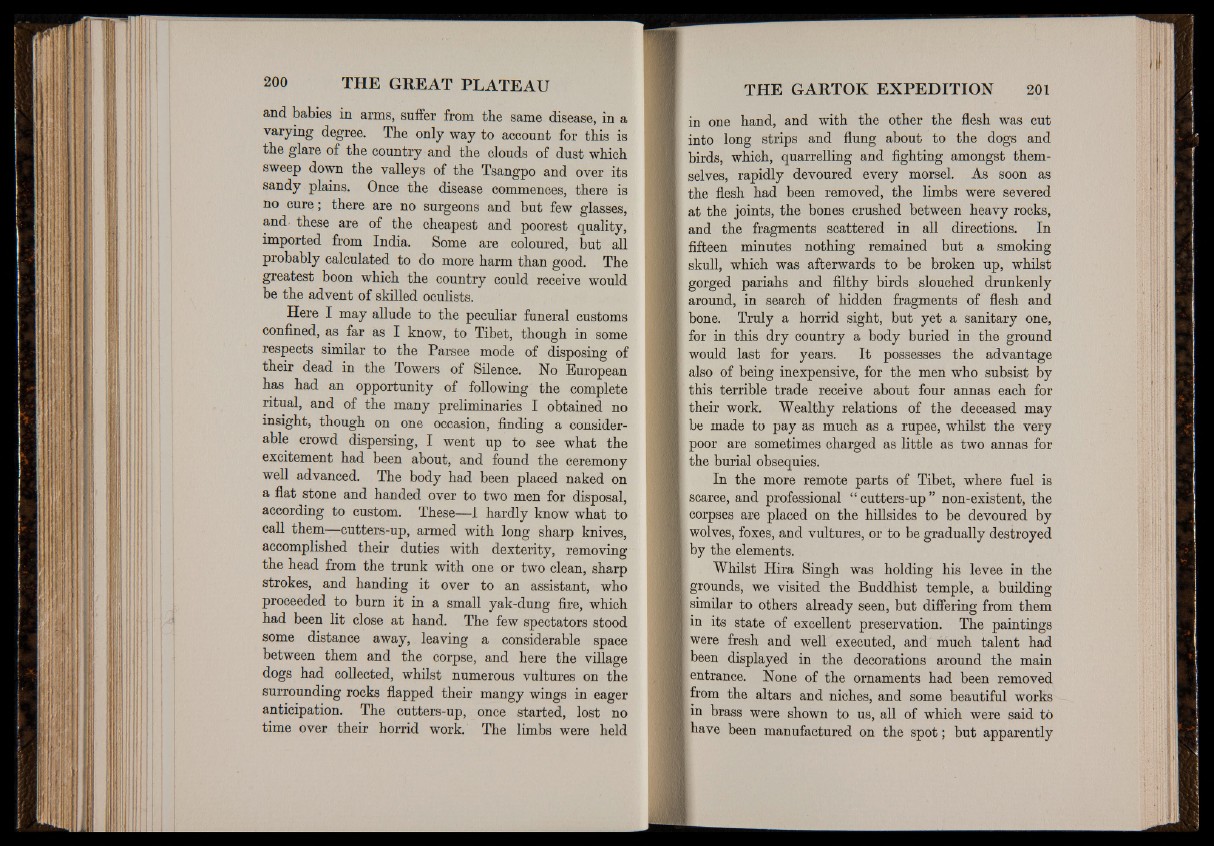
and babies in arms, suffer from the same disease, in a
varying degree. The only way to account for this is
the glare of the country and the clouds of dust which
sweep down the valleys of the Tsangpo and over its
sandy plains. Once the disease commences, there is
no cure; there are no surgeons and but few glasses,
and these are of the cheapest and poorest quality,
imported from India. Some are coloured, but all
probably calculated to do more harm than good. The
greatest boon which the country could receive would
be the advent of skilled oculists.
Here I may allude to the peculiar funeral customs
confined, as far as I know, to Tibet, though in some
respects similar to the Parsee mode of disposing of
their dead in the Towers of Silence. No European
has had an opportunity of following the complete
ritual, and of the many preliminaries I obtained no
insight, though on one occasion, finding a considerable
crowd dispersing, I went up to see what the
excitement had been about, and found the ceremony
well advanced. The body had been placed naked on
a flat stone and handed over to two men for disposal,
according to custom. These—I hardly know what to
call them—cutters-up, armed with long sharp knives,
accomplished their duties with dexterity, removing
the head from the trunk with one or two clean, sharp
strokes, and handing it over to an assistant, who
proceeded to burn it in a small yak-dung fire, which
had been lit close at hand. The few spectators stood
some distance away, leaving a considerable space
between them and the corpse, and here the village
dogs had collected, whilst numerous vultures on the
surrounding rocks flapped their mangy wings in eager
anticipation. The cutters-up, once started, lost no
time over their horrid work. The limbs were held
in one hand, and with the other the flesh was cut
I into long strips and flung about to the dogs and
1 birds, which, quarrelling and fighting amongst them-
I selves, rapidly devoured every morsel. As soon as
[ the flesh had been removed, the limbs were severed
I at the joints, the bones crushed between heavy rocks,
I and the fragments scattered in all directions. In
I fifteen minutes nothing remained but a smoking
I skull, which was afterwards to be broken up, whilst
I gorged pariahs and filthy birds slouched drunkenly
I around, in search of hidden fragments of flesh and
| bone. Truly a horrid sight, but yet a sanitary one,
I for in this dry country a body buried in the ground
I would last for years. It possesses the advantage
I also of being inexpensive, for the men who subsist by
I this terrible trade receive about four annas each for
I their work. Wealthy relations of the deceased may
I be made to pay as much as a rupee, whilst the very
I poor are sometimes charged as little as two annas for
1 the burial obsequies.
In the more remote parts of Tibet, where fuel is
I scarce, and professional “ cutters-up ” non-existent, the
I corpses are placed on the hillsides to be devoured by
I wolves, foxes, and vultures, or to be gradually destroyed
I by the elements.
IWhilst Hira Singh was holding his levee in the
K grounds, we visited the Buddhist temple, a building ; similar to others already seen, but differing from them
; in its state of excellent preservation. The paintings
I were fresh and well executed, and much talent had
| been displayed in the decorations around the main
| entrance. None of the ornaments had been removed
| from the altars and niches, and some beautiful works
in brass were shown to us, all of which were said to
¡have been manufactured on the spot; but apparently